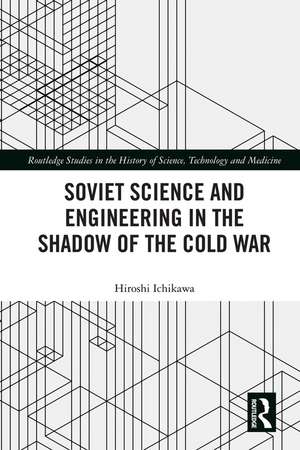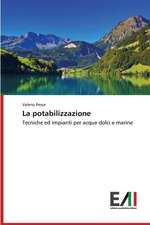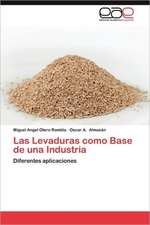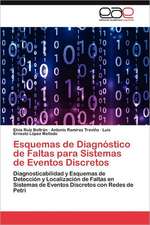Soviet Science and Engineering in the Shadow of the Cold War: Routledge Studies in the History of Science, Technology and Medicine
Autor Hiroshi Ichikawaen Limba Engleză Paperback – 30 iun 2020
Why were such a great number of scientific talents mobilized to various Soviet Cold War research and development projects? What were the true natures, and real consequences of the rushed Cold War projects? How did Soviet scientists approach the nuclear age? Thanks to the study of formerly classified Soviet archives, a more nuanced view of Soviet society has become possible. To resolve the above-mentioned questions, Ichikawa analyses the complicated interactions among various factors, including the indigenous contradictions in the historical development of science in the Soviet Union; conflicts among the related interest groups; relationships with the political leadership and the military, the role of ideology and others.
| Toate formatele și edițiile | Preț | Express |
|---|---|---|
| Paperback (1) | 271.02 lei 6-8 săpt. | |
| Taylor & Francis – 30 iun 2020 | 271.02 lei 6-8 săpt. | |
| Hardback (1) | 763.78 lei 6-8 săpt. | |
| Taylor & Francis – 19 oct 2018 | 763.78 lei 6-8 săpt. |
Din seria Routledge Studies in the History of Science, Technology and Medicine
- 5%
 Preț: 976.04 lei
Preț: 976.04 lei -
 Preț: 311.41 lei
Preț: 311.41 lei - 5%
 Preț: 296.12 lei
Preț: 296.12 lei - 18%
 Preț: 1017.91 lei
Preț: 1017.91 lei -
 Preț: 389.66 lei
Preț: 389.66 lei -
 Preț: 419.50 lei
Preț: 419.50 lei -
 Preț: 392.67 lei
Preț: 392.67 lei -
 Preț: 416.96 lei
Preț: 416.96 lei - 17%
 Preț: 259.07 lei
Preț: 259.07 lei - 5%
 Preț: 1158.84 lei
Preț: 1158.84 lei - 31%
 Preț: 764.20 lei
Preț: 764.20 lei -
 Preț: 436.02 lei
Preț: 436.02 lei - 18%
 Preț: 1000.27 lei
Preț: 1000.27 lei - 18%
 Preț: 1061.06 lei
Preț: 1061.06 lei -
 Preț: 450.40 lei
Preț: 450.40 lei - 16%
 Preț: 260.33 lei
Preț: 260.33 lei - 18%
 Preț: 956.07 lei
Preț: 956.07 lei -
 Preț: 389.11 lei
Preț: 389.11 lei -
 Preț: 287.41 lei
Preț: 287.41 lei - 31%
 Preț: 741.36 lei
Preț: 741.36 lei -
 Preț: 488.29 lei
Preț: 488.29 lei -
 Preț: 279.94 lei
Preț: 279.94 lei - 22%
 Preț: 327.96 lei
Preț: 327.96 lei - 12%
 Preț: 325.34 lei
Preț: 325.34 lei - 21%
 Preț: 905.45 lei
Preț: 905.45 lei - 18%
 Preț: 888.68 lei
Preț: 888.68 lei - 25%
 Preț: 324.29 lei
Preț: 324.29 lei -
 Preț: 492.96 lei
Preț: 492.96 lei - 5%
 Preț: 1158.89 lei
Preț: 1158.89 lei -
 Preț: 416.22 lei
Preț: 416.22 lei -
 Preț: 489.26 lei
Preț: 489.26 lei - 17%
 Preț: 259.98 lei
Preț: 259.98 lei - 25%
 Preț: 766.49 lei
Preț: 766.49 lei -
 Preț: 416.22 lei
Preț: 416.22 lei - 30%
 Preț: 768.10 lei
Preț: 768.10 lei - 38%
 Preț: 772.79 lei
Preț: 772.79 lei
Preț: 271.02 lei
Preț vechi: 325.72 lei
-17% Nou
Puncte Express: 407
Preț estimativ în valută:
51.86€ • 54.04$ • 42.94£
51.86€ • 54.04$ • 42.94£
Carte tipărită la comandă
Livrare economică 03-17 aprilie
Preluare comenzi: 021 569.72.76
Specificații
ISBN-13: 9780367585228
ISBN-10: 0367585227
Pagini: 206
Dimensiuni: 156 x 234 mm
Greutate: 0.38 kg
Ediția:1
Editura: Taylor & Francis
Colecția Routledge
Seria Routledge Studies in the History of Science, Technology and Medicine
Locul publicării:Oxford, United Kingdom
ISBN-10: 0367585227
Pagini: 206
Dimensiuni: 156 x 234 mm
Greutate: 0.38 kg
Ediția:1
Editura: Taylor & Francis
Colecția Routledge
Seria Routledge Studies in the History of Science, Technology and Medicine
Locul publicării:Oxford, United Kingdom
Public țintă
Postgraduate and UndergraduateCuprins
Preface
Introduction
PART.I. What Drove the Scientists to the Cold War?: In the Case of Physicists.
Chapter 1: "Jealousy" and "Discord:" The Conflicts among Physicists during the War.
Chapter 2. "Ideology" or "Harassment"? : "The Physics Conference" Unopened.
PART II, Some Aspects of the Soviet Cold War Research and Developments.
Chapter 3. "Foresight" or "Survival"? : Rocket Development and the Ministry of Armament
Chapter 4. Plunder of Technology: Jet Plane Development and German Technology
Chapter 5. "Concealed Rivalry": The Early Days of Computer Development.
PART III. "Hope" and "Anxiety:" Soviet Science at the Dawn of the Nuclear Age.
Chapter 6, Obninsk, 1955: The World’s First Nuclear Power Plant and "The Atomic Diplomacy" by Soviet Scientists.
Chapter 7. "A Double-edged Sword:" Radiation Studies and the Normalization of Biological Sciences.
Chapter 8. Anna Vasil’evna Kozlova (1906-19080): The Fate of the Data on the Casualties of Hiroshima, Nagasaki, and Bikini.
Conclusion
Index
Introduction
PART.I. What Drove the Scientists to the Cold War?: In the Case of Physicists.
Chapter 1: "Jealousy" and "Discord:" The Conflicts among Physicists during the War.
Chapter 2. "Ideology" or "Harassment"? : "The Physics Conference" Unopened.
PART II, Some Aspects of the Soviet Cold War Research and Developments.
Chapter 3. "Foresight" or "Survival"? : Rocket Development and the Ministry of Armament
Chapter 4. Plunder of Technology: Jet Plane Development and German Technology
Chapter 5. "Concealed Rivalry": The Early Days of Computer Development.
PART III. "Hope" and "Anxiety:" Soviet Science at the Dawn of the Nuclear Age.
Chapter 6, Obninsk, 1955: The World’s First Nuclear Power Plant and "The Atomic Diplomacy" by Soviet Scientists.
Chapter 7. "A Double-edged Sword:" Radiation Studies and the Normalization of Biological Sciences.
Chapter 8. Anna Vasil’evna Kozlova (1906-19080): The Fate of the Data on the Casualties of Hiroshima, Nagasaki, and Bikini.
Conclusion
Index
Notă biografică
Hiroshi Ichikawa is Professor of the History of Science and Technology in the Graduate School of Integrated Arts and Sciences at Hiroshima University, Japan
Descriere
Ichikawa analyses the complicated interactions among various factors, including the indigenous contradictions in the historical development of science in the Soviet Union; conflicts among the related interest groups; relationships with the political leadership and the military, the role of ideology; and others.



























